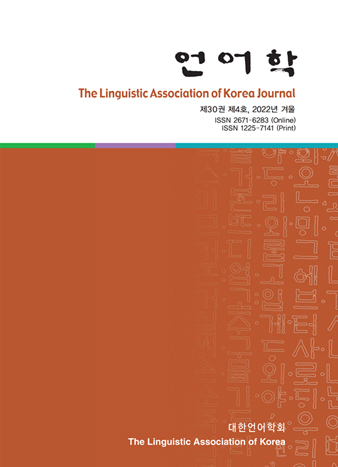대한언어학회 전자저널

30권 4호 (2022년 12월)
- 비표준 종결어미 ‘-을까요?’와 ‘-실게요’ 분석
-
윤재학 · 김기국
Pages : 63-84
Abstract
Yoon, Jae-Hak & Kim, Gigook. (2022). An analysis of non-standard sentence endings ulkkayo? and silkeyyo. The Linguistic Association of Korea Journal, 30(4), 63-84. Examining two non-standard sentence endings in Korean, we make an observation about the ulkkayo? form and make a case for a grammaticalization process for the silkeyyo form that provides a more intuitive explanation than in previous studies. An emerging non-standard use of the ulkkayo? form involves questions about something the listener must have direct access to, such as his or her own current state of mind or the number of his or her children, whereas the modality of the ulkkayo? form only describes a conjecture or surmise. It is illustrated that its anomaly derives from an incompatibility between questioned topics and the weak modal force of the form. The other non-standard sentence ending, the silkeyyo form, is an odd combination of the honorific marker si and ulkeyyo, the first person sentence ending, because rules prohibit self-honorification. It is hypothesized that this is the result of a grammaticalization process where a speaker utters the listener's expected answer, thereby shortening a conversational exchange in a hectic customer-service interaction. It is observed that the emergence of these non-standard forms reflects a society where politeness in the public sphere remains a high priority. Even when time efficiency forces a grammaticalization, it appears that a considerable effort is exerted to preserve a high level of politeness.
Keywords
# 공손성(politeness) # 문법화(grammaticalization) # 비표준 종결어미 (non-standard sentence endings) # 실게요(silkeyyo) # 을까요?(ulkkayo?)
References
- 강영리. (2016). ‘-ㄹ까’의 의향 용법에 대한 연구. 서울대학교 석사학위논문.
- 김하수. (1979). ‘-ㄹ까’의 의미와 통사적 특징. 외국어로서의 한국어교육, 4, 55-78.
- 박미은. (2016). 지시 화행에 사용되는 “-(으)실게요” 연구. 한국어 의미학, 51, 137-154.
- 박재연. (2006). 한국어 양태 어미 연구. 서울: 태학사.
- 박재연. (2013). 한국어 의도 관련 어미의 환유적 확장. 국어학, 68, 253-288.
- 안주호. (2017). 종결어미 {-(으)실게요}의 기능과 형성과정. 담화와 인지, 24(1), 47-67.
- 윤재학. (2000). 연접적 ‘이나’. 언어와 정보, 4(2), 41-54.
- 임동훈. (2001). ‘겠’의 용법과 역사적 해석. 국어학, 37, 115-147.
- 조숙환. (2009). 국어 인식양태소 구조의 인지언어학적 접근: 시점 이동과 역동적 심성 공간의 융합. 언어, 34(1), 113-132.
- Brown, P., & Levinson, S. C. (1987). Politeness: Some universals in language usage. Cambridge: Cambridge University Press.
- Kamp, H. (1978). Semantics versus pragmatics. In G. Guenthner & S. J. Schmit (Eds.), Formal semantics and pragmatics for natural languages (pp. 255-287). Reidel: Dordrecht.
- Lakoff, G., & Johnson, M. (1980). Metaphors we live by. Chicago: University of Chicago Press.
- Lakoff, R. (1973). The logic of politeness; or, minding your p's and q's. In Papers from the 9th regional meeting, 292-305.
- Leech, G. (1983). Principles of pragmatics. London: Longman.
- Yoon, J.-H. (2021). Semantic inflation and pronoun avoidance. Linguistic Research, 38(3), 469-490.